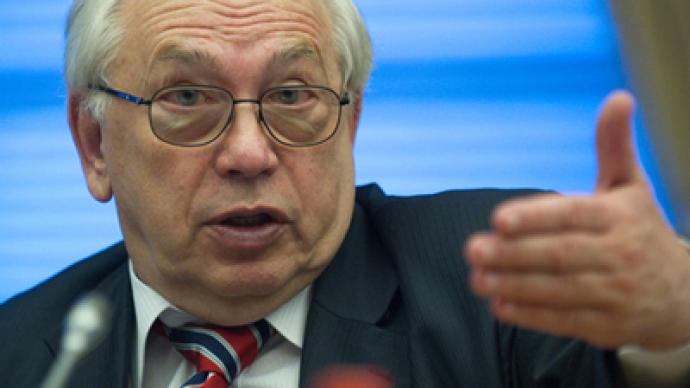
Russian Human Rights Ombudsman Has Little Effect on the Situation in the North Caucasus
Publication: Eurasia Daily Monitor Volume: 10 Issue: 63
By:

The annual report of the Russian human rights ombudsman, Vladimir Lukin, is interesting not so much for its conclusions as for the distrust it evokes among the country’s population. Ordinary Russian citizens have a skeptical attitude toward Lukin’s activities. The law enforcement agencies, in turn, ignore the ombudsman’s activities and do not regard his office as a state institution.
In his report for 2012, Lukin writes that he received over 24,000 complaints from Russians (https://ombudsmanrf.org/doklady/). Only 4.3 percent of the complaints came from the North Caucasus. Apparently, the Russian ombudsman’s office equated complaints from the North Caucasus, which included complaints about disappearances, murders and police abuse, with complaints from the rest of Russia about mundane problems like job losses or delayed salary payments. By mixing all sorts of problems together, the ombudsman intended to obscure the problem of violence in the North Caucasus region.
The report cites examples that show people in the North Caucasus do not trust the Russian ombudsman. Those few people who sought justice in the ombudsman’s office observed a pattern in which the official would wait years for formal, meaningless replies from the prosecutors in the North Caucasus (www.kavkaz-uzel.ru/articles/222138/).
The 2012 report cites some cases in which government officials ignored the ombudsman’s office. In one such instance, it describes how a resident of Dagestan’s Levashi district arrived at the district police station to receive some paperwork for his daughter but never left that facility. First, the police said they detained the man and took him to Makhachkala. Subsequently, the man’s relatives were told that the person, referred to in the report as M, was on the government’s wanted list and was killed when he attacked the police. The man’s relatives asked Lukin for help. Lukin’s office has been waiting for a reply from the Dagestani police and prosecutors since 2009 (Ombudsman’s report, part 2).
Another example of the law enforcement agencies’ disregard of the ombudsman comes from Ingushetia, where four people were killed during a police search operation. The killing took place according to the standard scenario in the North Caucasus. Four individuals, referred to in the report as B, K, M and E, residents of the city and district of Malgobek, were asked to return to their houses during the police search operation for additional questioning, after which each of them was shot and a handgun mysteriously appeared next to each of their bodies. When the ombudsman’s office queried prosecutors in Ingushetia about the incident, they said all four people had been killed after resisting the police officers, even though the victims had in fact been killed in cold blood. The Russian human rights organization Memorial conducted its own investigation into the incident and disproved the official explanation. According to Ibragim Bekbuzarov, the father of one of the victims, the police searched his son twice in the yard of their house. Given that Bekbuzarov’s son was wearing only a T-shirt and sweat pants, he could not have been concealing anything. Yet, after the search, the police led the young man into the house after which his father, who was ordered to stay outside, heard machine gun and handgun shots inside. The police told the elder Bekbuzarov that his son had been shot dead when he tried to attack the police officers (www.memo.ru/d/126210.html).
Abdurakhman Kurskiev, Ilez Merzhoev and Abubakar Yevloev were killed according to a similar scenario (https://www.kavkaz-uzel.ru/articles/212081/). The Russian ombudsman complained that his queries often go unanswered by the government agencies. It is unclear whether the ombudsman expected pity from the victims or recognition of his report as having been sufficient.
The ombudsman’s report does not include rights violations in the Russian prisons, and if such violations in the prisons were rare it would be possible to explain this gap by inattentiveness on the part of the ombudsman office. However, the persecution of North Caucasians in Russian prisons has been acute throughout the course of the Chechen war. Even the Chechen human rights ombudsman, Nurdi Nukhazhiev, appealed to the director of the Russian Prison Service, Alexander Reimer, to review the practice of transferring individuals imprisoned in the Chechen Republic to serve their sentences in remote Russian regions (https://euro-ombudsman.org/ombudsmen_activities/russia/ombudsman-chechni-vstupaet-protiv-napravleniya-osuzhdennh-v-otdalenne-region-rossii). According to Nukhazhiev, Chechen convicts complain that prison guards do not allow Muslims to perform their prayers and damage religious books. Nukhazhiev received such complaints in 2011 from prisons in the Sverdlovsk, Saratov, Omsk, Volgograd, Mordovia and Yamalo-Nenets regions. Prison administrations persecute inmates on religious grounds, insult Muslims and confiscate Qurans (www.kavkaz-uzel.ru/articles/215300/).
Lukin’s report also does not mention cases in which Muslims were insulted or prohibited from wearing the clothes they want to wear (https://top.rbc.ru/society/15/10/2012/674341.shtml).
Unfortunately, the Russian ombudsman did not consider it possible to allocate some space in his annual report to statements by Russian officials that insulted and called for the persecution of entire groups of people in the Russian Federation (https://ruskline.ru/news_rl/2012/08/09/vystuplenie_atkacheva_eto_udar_po_mezhnacionalnym_otnosheniyam_v_strane/).
Those who read the Russian ombudsman’s report will realize that it is incomplete, given what is going on in the Russian Federation. Therefore, it is not surprising that Russian citizens are seeking justice not in Moscow, but in Europe. In 2012 alone, more than 28,000 Russians were waiting for their cases to be heard by the European Court of Human Rights (https://europeancourt.ru/uploads/Statistika_Evropeyskogo_Suda_6.pdf). As long as the Russian ombudsman serves the interests of the Russian state instead of the people of Russia, the ombudsman’s office will not gain much respect from Russian citizens, who instead will continue to seek justice in Western Europe through the Strasbourg court.




